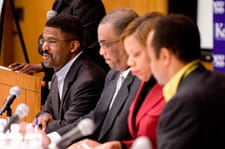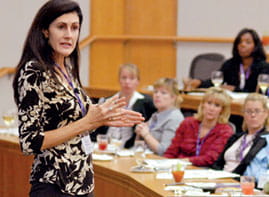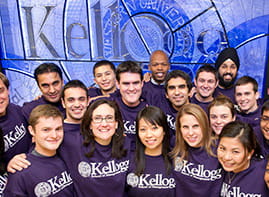With an African-American in the Oval Office, business leaders at the Kellogg Black Management Association look ahead to opportunity and change
2/23/2009 - Debate still rages over how much the racial divide in the United States has been narrowed by the election of the country’s first black president.
 |
Related Video |
|
| |
 |
| Panelists at the Black Management Association conference discuss the opportunities facing African-Americans. From left, BusinessWeek deputy Chicago bureau manager Roger O. Crockett; Kellogg entrepreneurship professor Steven Rogers; Chicago Urban League President Cheryle R. Jackson; Capri Capital Partners LLC president Quintin E. Primo III. |
| Photo © Nathan Mandell |
But speakers at the Kellogg School’s 22nd Black Management Association Conference on Saturday seemed to agree on one thing: now is the time for leaders in the African-American business community to leverage Washington’s prevailing political winds.
“What we have now is a crossroads in this country — we have people who are very smart, people who walked through the doors their parents knocked down,” said PBS political journalist Gwen Ifill as she moderated a discussion addressing the response of black business to President Barack Obama’s victory. “It’s an amazing moment.”
“How do you take advantage of it? How do we reap the benefits of the sacrifices that our parents made?” Ifill asked an audience of more than a hundred students, faculty and business leaders at the James B. Allen Center in Evanston. “There’s no one set of answers.”
| | |
| The afternoon roundtable capped an event that included sessions ranging from the impact of black MBAs in sports and emerging markets to multicultural marketing in the healthcare industry and the outlook for the real-estate market following the fallout in sub-prime lending. There were keynote speeches from Marc Morial, chief executive of the National Urban League, and Jonathan Rogers, CEO of TV One.
Throughout the day, corporate executives, private entrepreneurs, government officials and academics laid out a variety of strategies for fostering economic development under an administration that is facing a severe economic downturn marked by high levels of unemployment and shrinking access to capital.
“It starts with the African-American community really needing to be a lot more smart about having a game plan that makes sense that is going to drive economic sustainability,” Cheryle R. Jackson, president and chief executive of the Chicago Urban League, said in response to Ifill.
Speaking earlier in the day at the real estate session, Chauncey Mayfield, president and CEO of Chicago-based MayfieldGentry Realty Advisors LLC, struck a hopeful note for students, recalling that some of America’s most successful corporations got their start during recessions.
“The biggest companies in this country made their money in a downturn,” said Mayfield, encouraging young business leaders to harness their entrepreneurial spirit.
The afternoon panel moderated by Ifill called for proactive measures from the black community. They stressed that it is incumbent upon the newly minted ranks of African-American entrepreneurs emerging from the nation’s top business schools to take responsibility for the future of their community’s economic landscape and to be mindful of their roots. In order for Obama’s presence to be more than symbolic, they said, black leaders must take the initiative.
“Your job here first and foremost is to create businesses that are successful,” said Quintin E. Primo III, president and chief executive of Chicago-based Capri Capital Partners LLC, a Chicago-based real estate investment management firm. “Ultimately once you do that you have a responsibility in my opinion to employ people of color, to reach back down into the mud so to speak and bring our people out of the horrible conditions that they exist in.”
The group tackled topics ranging from the changing ethnic makeup of the U.S. population to the future of affirmative action and the role of the federal government in programs to assist minority businesses. Along with Primo and Jackson, participants included Roger O. Crockett, deputy bureau manager in Chicago for
BusinessWeek, and Steven Rogers, professor of entrepreneurship at Kellogg.
Rogers was arguably the most skeptical about the Obama administration, noting concern over what he characterized as an overly trusting view by many blacks that the election marked an end to racial divisiveness.
“This post-racial environment is quite naïve; it’s Pollyannaish, and it’s dangerous to the African-American community,” said Rogers, who said blacks should call on the Obama administration to reach out to the African-American community. “Color is still an issue. The board rooms are filled with predominantly white males.”
BMA attendees, regardless of their views on the matters, seemed energized by the debate.
Said Brittany Gregoy, a 23-year-old graduate student in psychology: “It’s (about) the definition of responsibility and how do we accomplish responsibility in the black community.”






